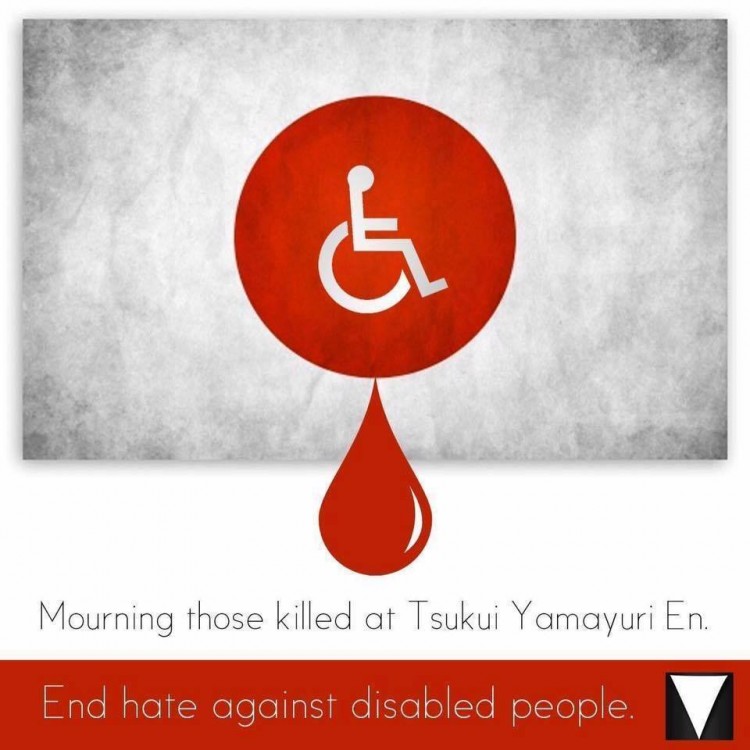It wasn’t until I realized one of the victims in the Japanese knife attack in Sagamihara could have been a relative of mine that the reality hit home for me. I knew she wasn’t in Sagamihara at all, but I was still terrified by the thought that it could have been her. If this person had gone to a different part of Tokyo, he could have killed her. It was — and still is — a sobering thought.
On July 26, 2016, a former employee of a facility for people with mental and other disabilities stabbed 19 residents to death, ranging in age from 19 to 70. Reports also say that the young man — who is my age, another chilling thought — said that he wanted disabled people to “disappear.”
As a Japanese-American individual who has a passion for mental health, I didn’t know quite how upset I was about it until a few days ago, something that I (sadly) attributed to the sheer number of mass killings that have occurred since the year began. Yes, of course the countless other mass killings were (and still are) tragedies. No single tragedy is more important than another. But this one affected me more than even the Pulse massacre because of my personal connection to Japanese culture.

I saw few reports of the attack from news outlets that weren’t foreign. To be fair, I was so distressed when I first heard about the attack that I decided to put my mental health first. I knew that if I read into the details, I would not be able to function properly. Deliberately blocking out news outlets for the next few days helped me regain some sense of emotional balance.
This attack disturbs me for many reasons. In Japan, there is more of an emphasis on putting others’ needs before your own, and not “rocking the boat,” shall we say. Going back and forth between Japan and the United States, I learned very quickly that expressing your emotions sans filter in Japan was, and still can be, frowned upon. One is valued for their ability to conform, and frowned upon should they choose to stand out. You are given one (and only one) shot at college entrance exams per year; should you fail, you will be known as a ronin, a word that remains from the age of the samurai, a word that was used to refer to warriors who had no master to serve.
Japan has one of the highest suicide rates in the world. In 2014, 25,427 people died by suicide. And that was the lowest the suicide rate has been in over 18 years.
Encouraging? Yes. Still disturbing? Yes. People with disabilities have an even harder time responding to the overwhelming pressure of living in Japanese society. Mental health is not openly discussed; as in many other Asian countries, it is still very much a taboo subject. Depression was not widely recognized in Japan until the late 1990’s.
Knowing that this young man previously worked at the Sagamihara center disturbs me even more, especially as someone who regularly works with people who deal with mental health challenges. Perhaps I’m being too generous or naive, but I would hope that individuals who work with people with disabilities every day would develop a sense of compassion and acceptance for them, especially working with them so closely. However, this was not the case with this young man, someone who, despite having a supposedly cheerful image, wanted “Japan to be a country where the disabled can be euthanized.” It just goes to show that you never know what someone you think you know is really thinking.
While I appreciate the idea of praying for a country in times of crisis (a social media trend that, as far as I’m aware, did not occur in the instance of this attack), I don’t believe that praying for a country is
going to help much. Yes, people who feel powerless when they see these tragedies occur try to find comfort by doing something — anything — they can think of. I understand that. But prayer alone is not going to bring about the massive change that clearly needs to occur, not just in Japan, but in this world.
When you ask people how they are, most of us will trot out the answer “I’m fine” automatically. Very few of us will say, “I’m (insert expletive of choice here) miserable. I lost my job, my anxiety is terrible, my car broke down, and all I want to do is watch cartoons and cry.” We choose saying that we’re fine for various reasons, and I’m not going to pretend to know all of them, especially because we all come from different backgrounds and circumstances. I’ve found that opening up about your emotions makes you more relatable. By being honest and vulnerable about your story, you give others around you permission to do the same.
I understand that in various cultures it’s difficult to do something so revealing when such actions are frowned upon. But if you lie once about how you feel, you’re going to have to lie again, and continue to lie until you can’t distinguish the truth from your story.
My hope for the world is that we can all — regardless of background and circumstance — learn to be just a little more honest when we interact with others around the world. Real change doesn’t come
from prayer. Real change comes as a result of thousands of efforts from thousands of people who challenge the status quo. Real change comes from people listening carefully to those who are different from them and working together, not euthanizing an entire population of individuals just because they are different from the people around you. Real change starts with us.
